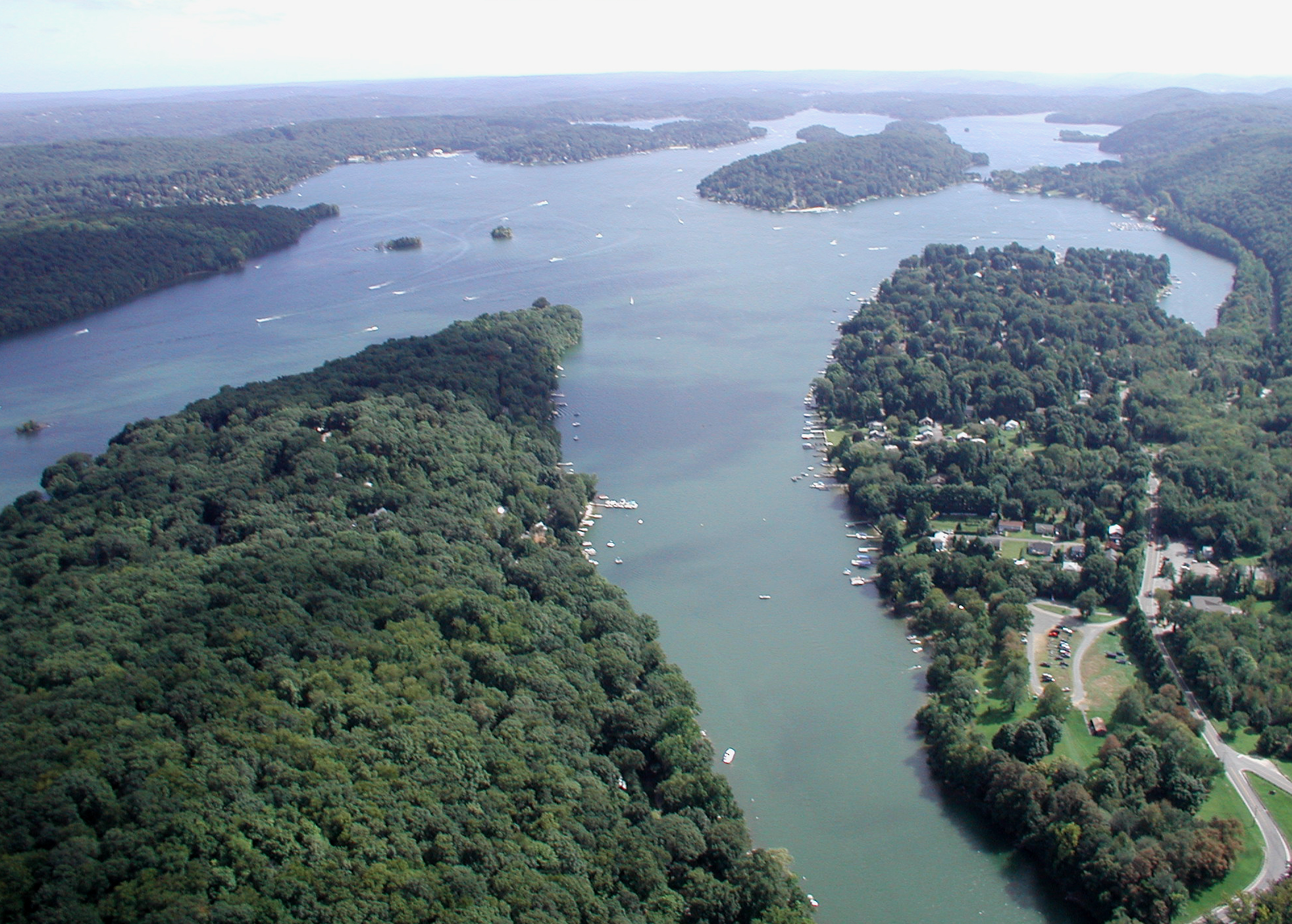Lake Symposium 2021
-
What do we want
from our lakes?
A Fall Science at Night seminar series for the public, students, and scientists interested in local lake conservation and management.
Based on the conversation started in 2019 , stakeholders will be able to understand how they can help prioritize economic interests in Connecticut Lakes.
Co-sponsored by Connecticut Federation of Lakes
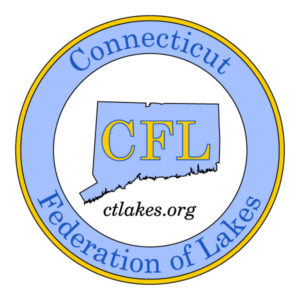
“From Concepts to Case Studies.”
7 p.m. – Larry Marsicano, Aquatic Ecosystem Research LLC. Marsicano is a WCSU Limnology instructor who will welcome attendees.
7:10 p.m. – Fred Lubnow, director of Aquatic Programs, Princeton Hydro. He will discuss “The Lake Hopatcong (NJ) Story.”
7:50 p.m. – Audience Q & A
8:05 p.m. – Nelson Malwitz, chairman of Brookfield WPCA, and Pio Lombardo, P.E., principal at Lombardo Associates. He will discuss “Impacts of on-site septic systems on Candlewood Lake.”
8:45 p.m. – Audience Q & A
Registration is required. Register at https://westconn.tfaforms.net/217. A custom link will be emailed on the day of the talk.
“The Power of the Past and Present Data.”
7 p.m. – WCSU Professor of Biology Dr. Theodora Pinou, who will introduce the topic and the speaker.
7:20 p.m. – Traci Iott, supervising environmental analyst, Water Quality Group, CT DEEP Bureau of Water Protection & Land Reuse, who will discuss “Statewide Lake Nutrient TMDL and Bantam Lake Appendix.”
8 p.m. – Audience Q & A
8:10 p.m. – Susan Peterson, Housatonic and Farmington Watershed manager, CT DEEP Bureau of Water Protection & Land Reuse, who will discuss “Bantam Lake Watershed-Based Plan Addendum.”
8:50 p.m. – Audience Q & A
Registration is required. Register at https://westconn.tfaforms.net/217. A custom link will be emailed on the day of the talk.
“Does Climate Change Impact Our Lakes?”
7 p.m. – Larry Marsicano, Aquatic Ecosystem Research LLC, WCSU Limnology Instructor, will introduce the topic and speaker.
7:10 p.m. – David C. Richardson, Professor, Biology Department, New Paltz, who will discuss “Lake Warming and Increased Stratification at Mohonk Lake Across Northeastern North American Lakes.”
7:45 p.m. – Audience Q & A
8 p.m. – Dr. Ben Burpee, Ph.D., Limnologist, GZA GeoEnvironmental, Inc, Coventry, CT who will discuss "Ecological Effects of Recent Climate Change on Southern New England Lakes and Reservoirs: Implications for Water Quality and Management"
8:30 p.m. – Audience Q & A
8:45 p.m. – Symposium summary and “Where do we go from here?”
Registration is required. Register at https://westconn.tfaforms.net/217. A custom link will be emailed on the day of the talk.
For more information, please contact Dr. Theodora Pinou, professor of Biology, at Pinout@wcsu.edu.
Representative Experts and Speakers
Laurence Marsicano, Lake Communities Symposium Co-organizer, Aquatic Ecosystem Research, Limnologist & WCSU Biology Instructor. lmarsicano@aerlimnology.com

Larry obtained his B.A. from Western Connecticut State University in 1988 and his M.A. from Connecticut College in 1993. He managed the Freshwater Ecology Laboratory at Connecticut College for Dr. Peter Siver from 1990 to 1997 which specialized in paleolimnology and regional lake water quality studies. His publications can be viewed at the Silica Secchi Disk website. In 1998 he was hired by the Candlewood Lake Authority and in 2003 became the Executive Director of that public lake management agency, the largest lake in Connecticut. He held that position until 2017 when he became a Principal Partner at Aquatic Ecosystem Research, LLC. He also teaches limnology to graduate students in the WCSU MS in Integrative Biological Diversity Program.
Theodora Pinou, Western Connecticut State University, Professor of Biological and Environmental Sciences, MS in Integrative Biological Diversity Program Director and Coordinator.

Dr. Pinou is Department Chair and professor of Biological and Environmental Sciences at WCSU. She is also a Curatorial Affiliate in Vertebrate Zoology at the Peabody Museum of Natural History at Yale University. She received her BA, MA, and Ph.D at New York University in Biology, with a focus in vertebrate evolution and ecology.
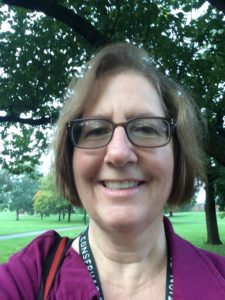
Traci is a supervisor for the Water Quality Group within the Water Planning and Management Division of the Connecticut Department of Energy and Environmental Protection and has worked at CTDEEP for more than 30 years. She works with a group of scientists who are responsible for the Connecticut Water Quality Standards and the development of other risk-based environmental criteria for use in permitting and remediation programs. Additionally, she supervises the Clean Water Act TMDL Program and is responsible for developing plans to restore and protect water quality through either the development to Total Maximum Daily Load analyses, ecological risk assessments for remediation programs or assistance to other implementation programs. Traci is the co-chair of the Association of Clean Water Administrators Watersheds Committee and the Region 1 State Representative to the Water Quality Standards Managers Association.
Traci received a B.S in Biology from Fairfield University in 1984 and a M.S in Zoology from the Ohio State University in 1987. Her graduate work focused on environmental toxicology and included a research study to link cancer in a fish population with contaminated sediments in their environment.
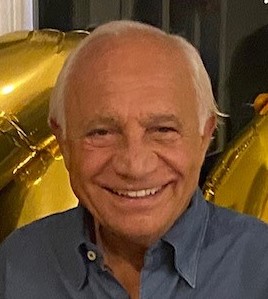
Pio Lombardo, P.E., President of Lombardo Associates, has a BS in Chemical Engineering, cum laude, and MS in Civil/Environmental Engineering along with 50 years of experience throughout the United States on lake water quality and innovative wastewater management systems for unsewered communities. Pio is considered a national expert on decentralized wastewater management, alternative sewer systems and passive nitrogen and phosphorus removal techniques, including non-sewer alternative permeable reactive barriers for nutrient removal. He has engineered $200+ million of innovative water quality and wastewater projects. He has received the prestigious American Consulting Engineer's Council Engineering Excellence Award for his work and named an Engineering News Record Construction Man of the Year candidate.
Pio Lombardo has authored or been a contributor to eight (8) US EPA manuals since 1979 on decentralized wastewater management issues and alternative sewers. Pio authored the 1st version of the US EPA water quality model HSPF which is widely used for Total Maximum Daily Load determinations to achieve water quality standards. He was chair and vice-chair of the national Water Environment Federation Small Community Committee and prepared the Brookfield Candlewood Lake Wastewater Facilities Plan which examined the impact of septic systems on Candlewood Lake and the area’s water supply.
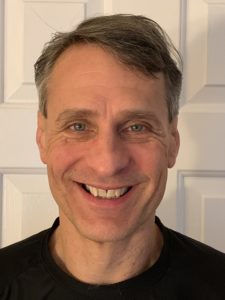
Dr. Fred S. Lubnow is the Director of the Aquatic Programs at Princeton Hydro. Dr. Lubnow received his Bachelor of Science in Biology from Susquehanna University (1988), his Master’s degree in Environmental Sciences (1992) and his Ph.D. in Limnology (1994) both from the University of California Davis. Dr. Lubnow has been an environmental consultant for over 28 years and has worked on a variety of ecosystems throughout the Mid-Atlantic States. His areas of expertise include the identification of algae and zooplankton, the management of cyanobacteria and their cyanotoxins, the design and implementation of in-lake management strategies and the development of watershed-based management plans that focus on non-point source pollution. Dr. Lubnow was the Region III Director of the North American Lake Management Society and the Treasurer for the Pennsylvania Lake Management Society. Dr. Lubnow is also an adjunct professor at Delaware Valley University, where he teaches a course and laboratory on Watershed Management.
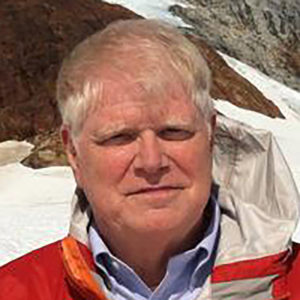
Nelson is Chairman of the Brookfield Water Pollution Control Authority since 2009. It is a volunteer position for the sewer enterprise in Brookfield. Nelson holds a BS in Chemical Engineering from NJIT and a MS in Chemical Engineering from Lehigh University. He retired from a career as a Director of Research for a Fortune 500 company. He has traveled to 45 countries and all 50 states.
He has recently successfully obtained study grants for $600,000 in project funding to complete Brookfield Sewer Utility Facility Plan and the Brookfield Candlewood Lake Wastewater Facilities Plan. The Candlewood plan examined the impact of septic systems on and near Candlewood Lake and the area well water supply. The findings will be presented in this talk.
He is working on securing grants for the engineering and a subsequent construction of a wastewater collection system for the Candlewood Peninsula and vicinity to reduce the nutrient loading of this largest lake in Connecticut.
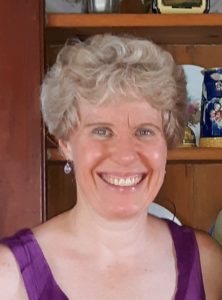
Susan Peterson is an Environmental Analyst 3 in the Watersheds Group within the Water Planning and Management Division of the Connecticut Department of Energy and Environmental Protection and has been with the Agency for almost 22 years. One of three watershed managers, she helps oversee projects for the CT DEEP Sec. 319 Nonpoint Source Grant program and works on other water quality and water resource issues, primarily in the Housatonic and Farmington watersheds. Prior to joining CT DEEP in 1999, Susan worked for several non-profit environmental education and environmental organizations.
Susan received a B.A. in Botany from Connecticut College in 1983 and an MES from Yale School of Forestry and Environmental Studies (now Yale School of the Environment) in 1992.
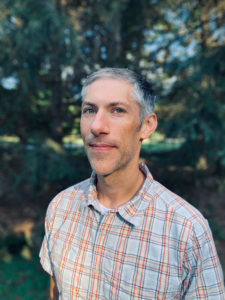
Dr. David Richardson is a professor in the Biology Department at SUNY New Paltz and has appointments as a Research Associate at the Mohonk Preserve and Visiting Scientist at the Cary Institute of Ecosystem Studies. Dr. Richardson is also a member of the Global Lake Ecological Observatory Network (GLEON) that is a network of people, lakes, and data from around the world. He conducts research on global freshwater ecosystems with focuses on climate change, food webs, and biogeochemistry. Some current projects include examining changes in lake ice phenology and summer stratification in global lakes, establishing the ecosystem structure and function of the smallest lentic ecosystems (ponds), and determining what controls nutrient limitation in lake phytoplankton. At SUNY New Paltz, Dr. Richardson focuses on undergraduate quantitative and ecological classes and undergraduate-driven research

Dr. Ben Burpee is an Applied Limnologist at Ecosystem Consulting Service (ECS), a division of GZA GeoEnvironmental, Inc. It is his task to promote and implement empirically-based, effective, and proactive lake and reservoir management in the face of climate change and other environmental issues.
Dr. Burpee has eight years of research and applied limnology experience. His experience includes the completion of many international field expeditions, projects, publications, and presentations. His research has focused on impacts of lake ecosystems from climate change and other anthropogenic drivers, such as atmospheric nutrient deposition.
Education:
Ph.D., Limnology and Freshwater Ecology Concentration, Climate Change Institute and School of Biology and Ecology, University of Maine, 2020
M.S., Limnology and Freshwater Ecology Concentration, Climate Change Institute and School of Biology and Ecology, University of Maine, 2015
What do we want from our lakes?
A Fall Science at Night seminar series for the public, students, and scientists interested in local lake conservation and management.
Based on the conversation started in 2019, stakeholders will be able to understand how they can help prioritize economic interests in Connecticut Lakes.
Co-sponsored by Connecticut Federation of Lakes

“Reflecting on aquatic invasive plants and harmful algal blooms (HAB’s), continuing and new challenges”
Special Announcement: Info on soon to be released: Request for proposals for projects to address aquatic invasive species and HAB’s
7 p.m. – Larry Marsicano, Aquatic Ecosystem Research LLC., WCSU Limnology Instructor, Welcome address
7:10 p.m. – Carl Brussells, Chad Holbrook and Casey Welch Moorer, Aquatic Plant Control Program, Santee Cooper, SC – “Biological Management of Aquatic Plants.”
7:40 p.m. – Larry Marsicano will Introduce Lake Community Panelists and have them briefly summarize their top two challenges this summer – Summary to be shared with everyone at end of meeting.
8:20 p.m. – Robbie Mordente, MS Integrative Biological Diversity 2022, to describe summer 2020 activities in addressing aquatic plant lake management issues, and introduce Matthew Goclowski, CT DEEP. Announce RFP & Intro to Lake Risk Assessment Educational Instrument.
8:45 p.m. – Questions from Panelists, to each other, and about RFP and Assessment Instrument
“Using data to assess our lakes.”
7 p.m. – Theodora Pinou will Introduce the topic, and the speaker.
7:10 p.m. – Edward Machowski, CT DEEP, Lake habitat sustainability and ecosystem balance in CT lake management.
7:40 p.m. – Questions to speaker from audience
8:00 - 9 p.m. – Reflecting on the Lake Risk Assessment Educational Instrument by regional Lake communities. Feedback of Risk Assessment Instrument – How does your Lake score and what does it mean? Where do we go from here?
“Best Practices for managing Aquatic plants and HABs; Biological, Chemical, Mechanical success stories.”
7 p.m. – Theodora Pinou will Introduce the session and a call for a CT Volunteer Lake Management Program
7:05 – 7:35 p.m. – J. Reyes, Aquatic ecologist, Northeast Aquatic Research, “Strategies beyond grass carp for managing aquatic plant growth”.
7:35- 7:45 p.m. – Questions from audience
7:50 – 8:15 p.m. – TBD – James Haney, University of New Hampshire – “Can HAB’s be controlled?”
8:20 – 8:30 p.m. – Questions from audience
8:35 – 8:45 p.m. – Closing/Final Thoughts on Risk assessment Instruments.
8:50 p.m. – Symposium Summary and Where do we go from here?
Laurence Marsicano, Lake Communities Symposium Co-organizer, Aquatic Ecosystem Research, Limnologist & WCSU Biology Instructor. lmarsicano@aerlimnology.com
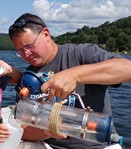
Larry obtained his B.A. from Western Connecticut State University in 1988 and his M.A. from Connecticut College in 1993. He managed the Freshwater Ecology Laboratory at Connecticut College for Dr. Peter Siver from 1990 to 1997 which specialized in paleolimnology and regional lake water quality studies. His publications can be viewed at the Silica Secchi Disk website. In 1998 he was hired by the Candlewood Lake Authority and in 2003 became the Executive Director of that public lake management agency, the largest lake in Connecticut. He held that position until 2017 when he became a Principal Partner at Aquatic Ecosystem Research, LLC. He also teaches limnology to graduate students in the WCSU MS in Integrative Biological Diversity Program.
Theodora Pinou, Western Connecticut State University, Professor of Biological and Environmental Sciences, MS in Integrative Biological Diversity Program Director and Coordinator.
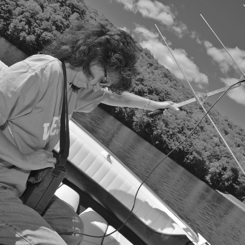
Dr. Pinou is Department Chair and professor of Biological and Environmental Sciences at WCSU. She is also a Curatorial Affiliate in Vertebrate Zoology at the Peabody Museum of Natural History at Yale University. She received her BA, MA, and Ph.D at New York University in Biology, with a focus in vertebrate evolution and ecology.
Arthur (Sandy) Blanchard, Lake Housatonic Authority, Treasurer.
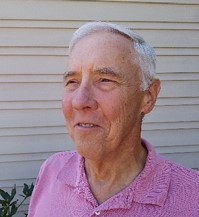
Sandy serves the LHA as Treasurer, and as such is responsible for budget preparation and keeping the Authority on a strong financial footing. He is also a member of the local rowing community and maintains strong communications links to this important sector of the local community. Although now retired, Sandy’s career included management consulting with international firms and governments to assist with resource development projects, sales and marketing of scientific instruments and high precision metal stampings, and the management of manufacturing and housing development companies. He is a graduate of MIT and the Harvard Business School.
Arthur Brody, Lake Waubeeka Past Board President (7/2017-9/2020)
Lake Waubeeka, located in Danbury, Connecticut, consists of 262 homes, recreation fields, community center which is built around a 35-acre lake and surrounded by >550 acres of undeveloped woodlands. The community own’s its own water systems and employs maintenance and office staff. Arthur has had executive leadership roles that spanned over 40 years working for Salomon Brothers, Reuters, Quest Diagnostics and most recently served as Managing Director of Global Sourcing & Operations at Fortress Investment Group in New York City.
Carl Brussells, Aquatic Plant Control Program, Santee Cooper, SC
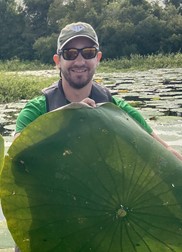
Carl graduated from the College of Charleston with a BS in Marine Biology. He worked for the South Carolina Department of Natural Resources in the Diadromous Fish Program and in Freshwater Fisheries for 7 years, and is entering his 5th year as a biologist at Santee Cooper where he specializes in ambient water quality and aquatic vegetation management. He is the current president of the South Carolina Aquatic Plant Management Society. Carl spends his spare time hiking, birding, and camping with his family, and is passionate about sparking interest in conservation and biodiversity in the general public.
George Buck, Ball Pond Advisory Committee, Ball Pond representative
George is a Penn State Alumnus. He was with IBM for 31 years. His last position was in contracts and negotiations for the mainframe sector. He has been interested in grass carp as a bioregulator since the mid-80’s, and an original member of the Ball Pond Advisory Committee reporting to the Town of New Fairfield. He continues to volunteer for the BPAC as well as other projects.
Gary Fillion, Chairman, Lake Zoar Authority.
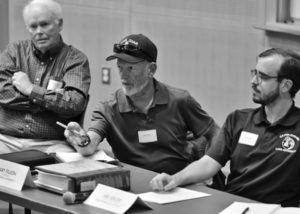
Graduated from WMU with an Automotive Engineering degree with Marketing and Sales Adm. minors. Worked for 30 years in Industrial Sales and Marketing, traveling the world as Technical Sales Mgr. Lastly, worked as a Facilities Director for 12 high end dealerships (22 buildings) responsible for all building and property needs. Have been an LZA member for 8 years, the last four as Chairman. His retirement home and piece of paradise is right on Lake Zoar!
Matthew Goclowski, Fisheries Biologist, CT DEEP
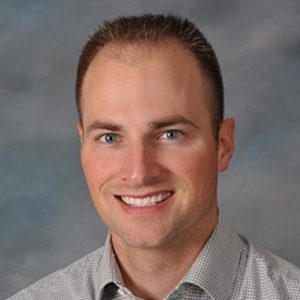
Matt works in the Fisheries Division’s Habitat Conservation and Enhancement Program and is primarily responsible for reviewing various DEEP permit applications that have the potential to affect fish or fish habitat as well as administering the state’s triploid Grass Carp permitting program. Prior to coming on full time with the Fisheries Division, he worked as an environmental scientist on a variety of projects including fish passage studies, instream flow studies, and utility infrastructure permitting projects. He holds a Bachelor’s degree in Natural Resources Management & Engineering from UCONN, a Master’s degree in Fisheries Management from Auburn University, and a GIS certificate from Penn State.
James Haney, Professor, University of New Hampshire – “Can HAB’s be controlled?”
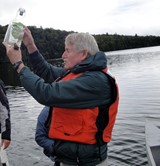
Jim Haney is a Professor in the Department of Biological Sciences at the University of New Hampshire. He is Director of the UNH Center for Freshwater Biology and co-founder of the New Hampshire Lakes Lay Monitoring Program. Dr. Haney teaches General Ecology, Lake Ecology, Stream Ecology and Ecotoxicology. His current research focus is on the transfer of cyanobacteria toxins within the lake food webs and their impact on wildlife such as fish and the Common Loon. Other research projects include 1) toxic aerosols as risk factors from lakes with toxigenic cyanobacteria 2) use of cyanobacteria pigments to predict cyanobacteria blooms and lake toxicity. He and his students are also conducting collaborative research with Dartmouth-Hitchcock ALS Clinic to examine toxic aerosols as possible links between cyanotoxins and neurological disorders such as amyotrophic lateral sclerosis (ALS) and Alzheimer’s disease. He is also a member of the USP EPA Region 1 Cyanobacteria Monitoring Collaborative (cyanos.org).
Chad Holbrook, Aquatic Plant Control Program, Santee Cooper, SC
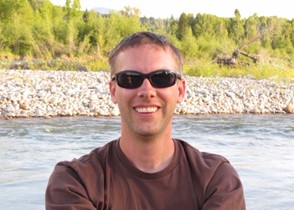
Chad Holbrook is an Environmental Specialist at Santee Cooper (South Carolina Public Service Authority) with an emphasis on fisheries projects related to Federal Energy Regulatory Commission (FERC) license compliance. License compliance issues involve upstream and downstream passage of diadromous fish (American Shad, Blueback Herring, and American Eel) as well as population monitoring of federally endangered Atlantic Sturgeon and Shortnose Sturgeon in the reservoirs and downstream rivers.
Chad is a graduate of Virginia Polytechnic Institute and State University and Tennessee Technological University where he received a Bachelor of Science in Fisheries Science and a Master of Science in Biology. He has worked in the field of fisheries science since 2003 for a variety of employers including environmental consulting firms, state and federal agencies, and public utilities. He worked from 2006 -2019 as a fisheries biologist for the South Carolina Department of Natural Resources with responsibilities of freshwater and diadromous fisheries management in Lakes Marion and Moultrie and nine counties along the Atlantic Coast. Specific areas of interest were Blue Catfish and Striped Bass population management in Lakes Marion and Moultrie, Atlantic Sturgeon and Shortnose Sturgeon acoustic telemetry research in coastal rivers, and American Shad and Blueback Herring passage at St. Stephen Dam and Pinopolis Navigation Lock. He began working at Santee Cooper in 2019 and looks forward to the opportunity to continue to maintain/improve diadromous fish runs in the Santee Cooper System. Chad is an active member of the South Carolina Chapter of the American Fisheries Society
When he isn’t spending time on the water working, he enjoys saltwater fishing, chasing trout in the Appalachian Mountains, and hiking with family and friends.
Edward Machowski, Fisheries Biologist, CT DEEP
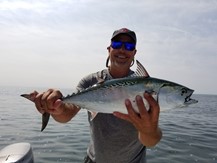
Ed has worked as a fisheries biologist since 1988. His career started in the cold-water realm by inventorying Connecticut's stream resources as part of the initial Stream Survey project. At present, he is one of two warm-water biologists in charge of managing the state's lake, pond and large river warm-water fish communities.
Casey Welch Moorer, Aquatic Plant Control Program, Santee Cooper, SC
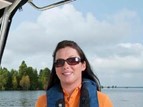
Casey Welch Moorer is the Manager of Biological Services at Santee Cooper (South Carolina Public Service Authority). The Biological Services team is responsible for the ambient water quality program on Lakes Marion and Moultrie, aquatic plant control on the lake system, vector management, internal sampling services, fish passage projects related to Santee Cooper’s FERC license and cooperative wildlife projects with South Carolina Department of Natural Resources (SCDNR) and United States Fish and Wildlife Service (USFWS).
Casey is a graduate of Winthrop University and Charleston Southern University, where she received a Bachelor of Science in Biology and a Master of Business Administration. She began her career with Santee Cooper in 2005. Casey is an active member of The South Carolina Aquatic Plant Management Society where she served as the president and a director for several years and currently serves as the society’s secretary. She is also a board director for the Lowcountry’s Enrichment in Abilities of the Disabled (L.E.A.D) and on a steering committee for Berkeley County Kids Who Care.
Her passions include finding the balance between all lake users, education/community outreach and protecting the Santee Cooper lake system from invasive plants and animals. When she isn’t spending time on the water she enjoys camping and traveling with family and friends.
Robbie Mordente, MS Integrative Biological Diversity 2022
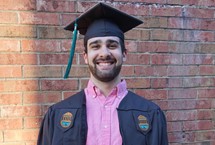
Robert Mordente, born and raised in New Milford CT. Graduated in 2019 from Coastal Carolina University with a biology degree and focus on cellular, molecular, and genetics. Proud to be a part of the second cohort in the integrative biology program at Western Connecticut State University. He has always been interested in environmental conservation and teaching the community about the importance of backyard nature. His interest in conservation sparked while participating in project CLEAR from 2012 to 2015 and he still carries this flame on this project.
James Olson, Lake Housatonic Authority, Aquatic Vegetation Management Coordinator.
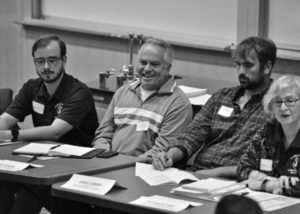
A. J. Reyes, Aquatic Ecologist, Northeast Ecosystems Research
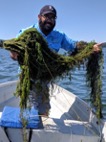
“Strategies beyond grass carp for managing aquatic plant growth”
A.J. Reyes received a Bachelor of Science in Ecology at SUNY Plattsburgh, and a Master’s of Science degree in Lake Management from SUNY Oneonta. AJ is also recognized as a Certified Lake Manager by the North American Lake Management Society. Before joining NEAR in 2017, A.J. spent years living in various parts of the country working on water quality and aquatic invasive species projects with the United States Geological Survey and the Yellowstone coalition. A.J. also served as an Extension Associate for North Carolina State University working on aquatic plant management. At NCSU he was the liaison between multiple stakeholder groups including the reservoir utility owner, the NC DEQ, and thousands of shoreline residents at Lake Gaston. Since working with NEAR, A.J. has served as the project manager for the Mid-Hudson River aquatic plant survey project, as well as many existing and newly established water quality and aquatic plant management programs in NY and CT.
Phyllis Schaer, Chairman, Candlewood Lake Authority
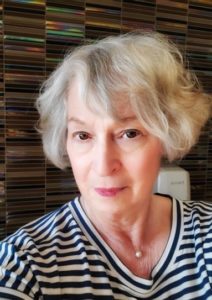
Phyllis Schaer- Chairman of the Candlewood Lake Authority since 2014 and CLA delegate from the town of Sherman since 2008. Life member of Connecticut Federation of Lakes. Member of North American Lake Management Society. Phyllis provided the initial research and development work to create and establish the Sterile Carp Management Program for Candlewood Lake. A lakefront home owner and resident of Sherman for 20+ years. Formerly Vice President of Tekcast Industries.
Neil Stalter, Candlewood Lake Authority, Director of Ecology and Environmental Education
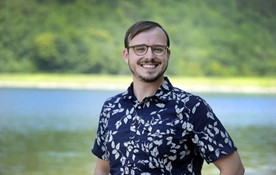
Neil Stalter joined the Candlewood Lake Authority as the Director of Ecology and Environmental Education during the summer of 2018. Having earned a Bachelor’s Degree from the University of Rochester in Ecology and Evolutionary Biology, as well as a Master’s in Public Administration in Environmental Science and Policy from Columbia University, Neil has the scientific and public policy background to support a government agency like the Candlewood Lake Authority. Neil grew up in the Finger Lakes region of New York, on Conesus Lake where his love of lakes began. At the CLA Neil manages the monthly monitoring program, designs new ecosystem protection initiatives and projects, reviews all relevant FERC documentation and writes and compiles all responses, and helps create new public education initiatives.
Connie Trolle, President of the Bantam Lake Protective Association and President, Connecticut Federation of Lakes
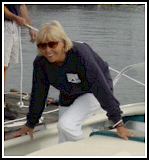
Connie Trolle is the President of the Bantam Lake Protective Association and the first woman to hold this position since the founding in 1925. In this role, she created a coalition fund to manage invasive weeds and storm water issues at Bantam Lake. She is also the current President of the Connecticut Federation of Lakes and instrumental in pushing forward the legislation that created legislation that will create a grant program for aquatic invasive species and cyanobacteria related projects. She is also served as a Commissioner of the Inland Wetland, Town of Morris; Chairman of the Board of Finance for the Town of Morris, and President of the Bantam Lake Task Force. Connie has lived on Bantam Lake as a summer resident all her life. She lives on the lake full time and is very active in the community.
Rebekah White, Director of Water Quality for Friends of the Lake (FOTL), Lake Lillinonah
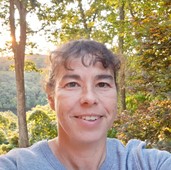
Rebekah White, Director of Water Quality for Friends of the Lake (FOTL), Lake Lillinonah serves as the treasurer for Connecticut Federations of Lakes (CFL). She began volunteering as a citizen scientist with FOTL starting in 2009. She volunteered as a monitor for the lake dock monitoring program, Citizen Led Environmental Observatory (CLEO). She also joined in on the monthly testing and calibration of their buoy deployed multiparameter sonde. She received her BA in Biology with a concentration in Ecology from Western CT State University in 2014, and continues to volunteer with FOTL. She also works part time during the season to improve the water quality program.
C. Peter Van Dine, Science Chair, Friends of Bolton Lakes
Jonathon Zwang, Co-Chair, Lake Committee, Lake Waubeeka

Jonathan is a resident of the Lake Waubeeka community. He holds an M.S. in Computer and Information Science from University of New Haven and a B.A. in biology from the State University of New York. more than 30 years of success across the information technology, financial, retail, manufacturing, pharmaceutical, chemical, and aerospace industries.
Jesse Uhrman, Co-Chair, Lake Committee, Lake Waubeeka
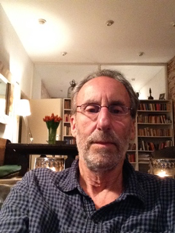
Jesse Uhrman is a resident of Lake Waubeeka for 69 years. He worked for the Legal Aid Society of New York City for 40 years as a social work administrator. He has been a member of the Lake Waubeeka Board of Directors for 15 year, and served as President for 5 years. He is currently the Lake Committee Co-Chair.
For more information, please contact Dr. Theodora Pinou, professor of Biology, at Pinout@wcsu.edu.


